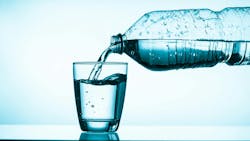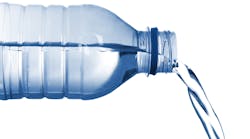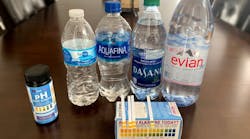Is your favorite bottled water affecting your (and your patients’) oral health?
(Note: This article won second place in Original Research in the RDH Student Awards Program, sponsored by PDT.)
When it comes to oral health, the type of water you drink might matter more than you think. Bottled water varies in pH levels depending on the brand, which leads to misconceptions about which brands to recommend. With bottled water being a staple in many households, it’s essential to understand its impact on oral health.
The role of dental hygienists in bottled water
Dental hygienists are increasingly incorporating nutritional counseling into their patient appointments, addressing aspects such as water intake. However, how often do they consider the pH levels of different bottled water brands when making recommendations?
Although dental hygienists are aware of the varying pH levels in bottled water, they may not always provide tailored recommendations. These findings can help them incorporate this information into patient education to ensure they recommend the most suitable bottled waters.
The purpose of this study
This original research aims to raise awareness about the knowledge gaps regarding daily water consumption and the selection of appropriate bottled water brands. By identifying the pH levels of various bottled waters and investigating how they alter pH levels in the oral cavity, this study also examines whether dental health professionals are making informed recommendations to their patients regarding bottled water brands.
The optimal pH level of saliva or the oral cavity is 7.0. Consuming beverages with low pH levels, particularly those at or below the critical pH level of 5.5, disrupts this alkaline balance. This exacerbates demineralization of tooth enamel and increases the risk of caries, dental erosion, and tooth sensitivity.
Research methodology
The study involved a comprehensive literature review on acidity levels and their effects on oral health, followed by data collection through customized surveys. We conducted two surveys: one targeting residents of Los Angeles County and the other aimed at registered dental hygienists across California. All participants were 18 or older.
The first survey asked LA County residents about their daily water consumption, type of water consumed (bottled, filtered, tap, etc.), and preferred bottled water brands. After collecting 222 survey responses from residents, we identified the top eight preferred bottled water brands and tested their pH levels using litmus paper to determine which had a pH level below the critical threshold of 5.5. For accuracy, two bottles from each brand were tested to ensure consistent pH levels.
Our key findings
The top eight bottled water brands consumed were, in order of popularity, Kirkland, Fiji, Smartwater, Nestlé Pure Life, Arrowhead, Dasani, Crystal Geyser, and Aquafina. Our analysis revealed that three out of these eight brands exhibited pH levels below the critical threshold of 5.5, indicating a potential risk to tooth enamel. Specifically, Smartwater, Dasani, and Aquafina had a pH level of 5, while Nestlé Pure Life approached the critical value with a pH of 6.
From 109 survey responses from RDHs, they revealed that during hygiene appointments, 67% of them advocate for water intake, while 33% do not. Interestingly, 72.5% of respondents acknowledged the variability in bottled water pH levels, but only 23.9% provided recommendations for specific brands.
Our conclusions
Despite dental hygienists' awareness of the diverse pH levels in bottled water, the majority do not provide tailored recommendations. These results highlight the importance of patient education regarding the dental ramifications of water selection, and they stress the necessity for well-informed guidance to mitigate the risk of dental decay.
Health-care professionals should inform patients about how their choice of bottled water impacts acidity and pH levels in the oral cavity. Understanding the pH levels in different bottled waters allows dental professionals to make informed suggestions, which ultimately benefits oral health.
About the Author

Angela Pacheco, BSDH, RDH, and Daseul Kim, BSDH, RDH
Angela Pacheco, BSDH, RDH, and Daseul Kim, BSDH, RDH, are recent graduates from West Los Angeles College in Culver City, California. They proudly won second place in the 2024 Spring CDHA poster competition for their original research components. Their passion lies in spreading awareness and promoting oral health in underserved communities and the field of dentistry as a whole. Their enthusiasm and love for patient care inspire those around them. For more information, email them at [email protected] and [email protected].


